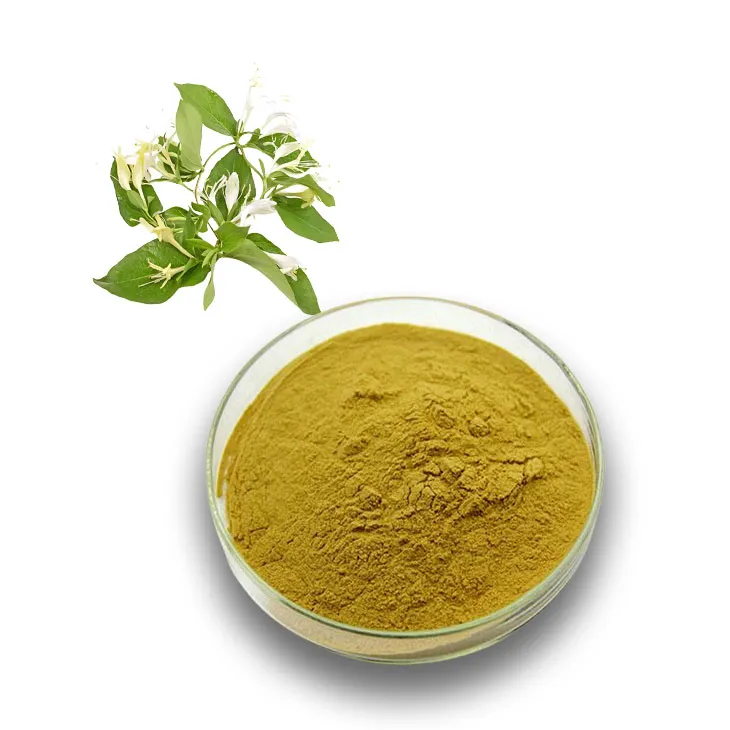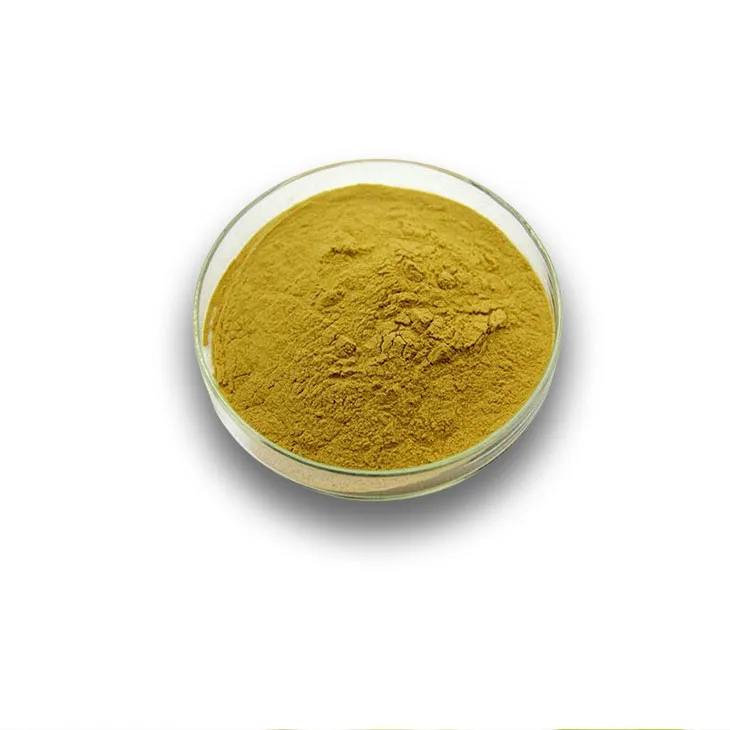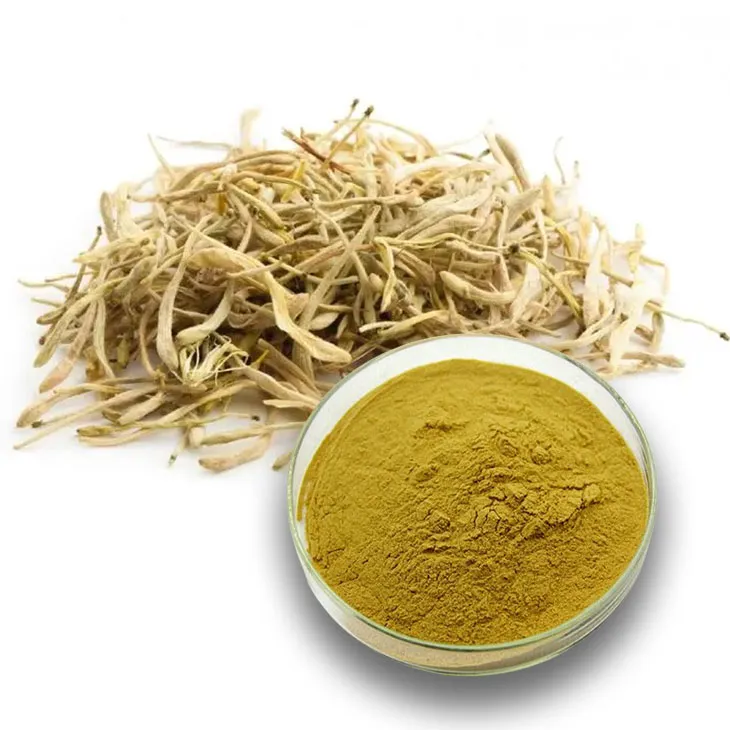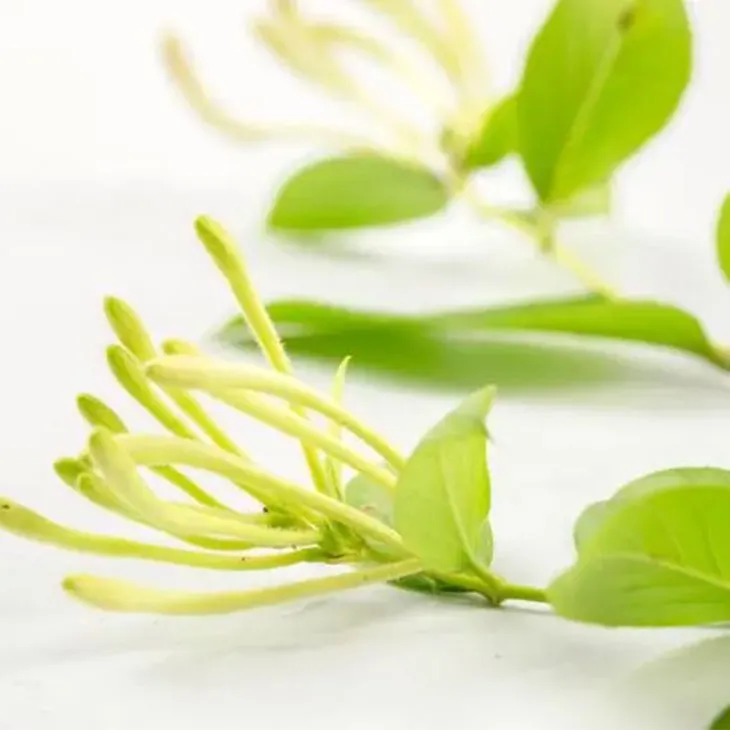- 0086-571-85302990
- sales@greenskybio.com
Honeysuckle pollen suppliers.
2024-11-30

Introduction to Honeysuckle Pollen
Lonicera japonica pollen, also known as Silver - and - Gold - Flower pollen, is a remarkable natural resource. It has a wide range of potential applications, which makes it an important commodity in several industries. In the health - care and pharmaceutical industries, it could potentially be used as an ingredient for various products. For example, it might be incorporated into herbal remedies or dietary supplements due to its possible beneficial properties. In the cosmetic industry, it could be used in skincare products such as creams and lotions, perhaps for its antioxidant or anti - inflammatory properties. In the food industry, it may find its place as a novel ingredient in certain specialty foods.

The Role of Suppliers in the Honeysuckle Pollen Supply Chain
Suppliers play a vital role in the entire process of bringing Lonicera japonica pollen to the market. Their responsibilities span a series of complex and interconnected tasks.
Cultivation Cooperation
1. Selecting Growers
- Suppliers need to carefully select growers with whom they will cooperate. These growers should have a good reputation for quality and environmental stewardship. They should be committed to sustainable farming practices and have the necessary expertise in cultivating Lonicera japonica plants.
- The selection process might involve evaluating the growers' past experiences, their land quality, and their understanding of the specific requirements of Lonicera japonica cultivation.
- Once the growers are selected, suppliers must work with them to ensure that the plants are grown in an environment - friendly manner. This could involve promoting the use of organic fertilizers and natural pest control methods. For example, instead of using chemical pesticides, they might encourage the use of beneficial insects to control pests that could damage the Lonicera japonica plants.
- Additionally, suppliers may need to ensure that the cultivation process does not cause excessive soil erosion or water pollution. This might require providing guidance on proper irrigation techniques and soil conservation methods.
- Suppliers also have a role in ensuring the high - quality growth of Lonicera japonica plants. They may need to set certain standards for plant spacing, pruning, and general plant care. For instance, proper plant spacing can ensure that each plant has enough sunlight and nutrients, which is crucial for healthy growth and maximum pollen production.
- Regular inspections of the cultivation sites may be necessary to ensure that the growers are adhering to these quality standards. If any issues are identified, suppliers should provide timely advice and support to rectify the situation.
Pollen Collection
1. Timing
- The timing of pollen collection is critical. Suppliers need to have a deep understanding of the Lonicera japonica plant's flowering cycle. Pollen is typically collected when the flowers are at their peak bloom, as this is when the pollen quantity and quality are likely to be at their best.
- Missing the optimal collection time could result in lower pollen yields and poorer quality. Therefore, suppliers need to closely monitor the plants and coordinate with growers to ensure that the collection occurs at the right time.
- Precision in pollen collection is also essential. Specialized collection methods should be employed to ensure that the pollen is collected without damage or contamination. For example, gentle brushing or suction techniques might be used to collect the pollen from the flowers.
- The collection equipment should be clean and properly maintained to prevent any foreign substances from getting mixed with the pollen. This requires strict quality control over the collection tools and procedures.
Processing Stage
1. Hygienic Standards
- In the processing stage, strict hygienic standards must be adhered to. The processing facilities should be clean and sanitized regularly. Workers involved in the processing should follow proper hygiene protocols, such as wearing clean uniforms, gloves, and hairnets.
- Any raw materials used in the processing, such as packaging materials, should also meet high - quality and hygienic requirements. This helps to prevent the introduction of contaminants that could affect the safety and quality of the pollen.
- Suppliers should also utilize advanced technological means in the processing of Lonicera japonica pollen. This could include techniques such as freeze - drying to preserve the pollen's properties. Freeze - drying can help to maintain the pollen's nutritional and biological activities by removing moisture without causing significant damage to its structure.
- Another example of advanced technology could be micro - encapsulation. This technique can protect the pollen from environmental factors such as moisture, oxygen, and light, which could otherwise degrade its quality over time. Micro - encapsulation can also make the pollen easier to handle and incorporate into different products in the various industries it is intended for.

Research and Development Efforts of Suppliers
1. Exploring New Applications
- Good suppliers are not content with simply providing the existing product. They engage in continuous research and development to explore more applications of Lonicera japonica pollen. For example, they may collaborate with research institutions or universities to study the pollen's potential in new areas such as anti - aging skincare or as a natural preservative in the food industry.
- Through in - depth research, suppliers can uncover new properties of the pollen that could open up new market opportunities. This could involve studying the pollen's chemical composition in more detail, its interaction with other substances, and its potential effects on human health or product performance.
- In addition to exploring new applications, suppliers also focus on improving the existing products that contain Lonicera japonica pollen. They may work on enhancing the stability of pollen - based products, improving their taste (in the case of food products), or increasing their efficacy (in the case of health - care and cosmetic products).
- This could involve reformulating products with better - quality pollen or adding complementary ingredients to enhance the overall performance of the product. For example, in a skincare product, they might combine the pollen with other natural ingredients known for their moisturizing or soothing properties.

Customer Communication and Market Demand Fulfillment
1. Understanding Customer Needs
- Suppliers need to have a clear understanding of the diverse needs of their customers. In the health - care industry, customers may be looking for products with specific health benefits, such as immune - boosting or anti - inflammatory properties. In the cosmetic industry, customers may be more interested in products that improve skin texture or reduce signs of aging.
- To understand these needs, suppliers may conduct market research, gather customer feedback, and stay updated on the latest industry trends. This information can then be used to guide their product development and marketing strategies.
- Based on their understanding of customer needs, suppliers can offer customized solutions. For example, they may be able to provide different grades of Lonicera japonica pollen to meet the specific requirements of different customers. A high - end cosmetic brand may require a very pure and refined form of the pollen, while a food manufacturer may be satisfied with a less refined but still high - quality version.
- Suppliers can also work with customers to develop new products or formulations. If a customer in the health - care industry has a concept for a new dietary supplement, the supplier can use their expertise in Lonicera japonica pollen to contribute to the product development process.
- By effectively communicating with customers and fulfilling their needs, suppliers can also contribute to the market expansion of Lonicera japonica pollen. They can introduce the product to new markets or customer segments. For example, they may target international markets where there is a growing interest in natural and herbal products.
- Suppliers can also participate in trade shows, industry conferences, and marketing campaigns to raise awareness of Lonicera japonica pollen and its potential applications. This can help to attract new customers and increase the overall demand for the product.

Challenges Faced by Honeysuckle Pollen Suppliers
1. Regulatory Compliance
- Suppliers of Lonicera japonica pollen face challenges related to regulatory compliance. Different industries have different regulations regarding the use of natural ingredients in products. In the pharmaceutical industry, for example, strict regulations govern the quality, safety, and efficacy of products. Suppliers need to ensure that their pollen meets all the relevant regulatory requirements.
- Additionally, there may be regulations regarding the cultivation, collection, and processing of the pollen. For instance, there may be restrictions on the use of certain pesticides or fertilizers in the cultivation process, or specific requirements for the processing facilities to meet certain hygiene and safety standards.
- The market for natural ingredients like Lonicera japonica pollen is becoming increasingly competitive. There may be other suppliers offering similar products, or alternative ingredients that could potentially replace the use of honeysuckle pollen in some applications.
- To stay competitive, suppliers need to continuously differentiate themselves. This could involve offering higher - quality products, better customer service, or more innovative research and development. For example, they may invest in developing unique processing techniques that result in a superior - quality pollen product.
- Like any agricultural product, Lonicera japonica pollen is vulnerable to supply chain disruptions. Natural disasters such as floods, droughts, or extreme weather events can affect the cultivation of the plants, leading to reduced pollen yields.
- Other factors such as pests and diseases can also impact the supply. A sudden outbreak of a pest or disease that affects Lonicera japonica plants could severely disrupt the supply of pollen. Suppliers need to have contingency plans in place to deal with such disruptions, such as having alternative sources of supply or implementing measures to prevent and control pests and diseases.
Conclusion
In conclusion, suppliers of Lonicera japonica pollen have a multifaceted and challenging role. They are responsible for every step in the journey from the cultivation of the plants to the delivery of the final product to the market. Through their efforts in cultivation cooperation, pollen collection, processing, research and development, customer communication, and dealing with various challenges, they contribute to the development and growth of the market for Lonicera japonica pollen. As the demand for natural and sustainable products continues to rise in various industries, the role of these suppliers will become even more crucial in ensuring the availability and quality of this valuable natural resource.
FAQ:
What are the main responsibilities of honeysuckle pollen suppliers?
Suppliers are responsible for a series of complex processes. They start with cultivation cooperation with growers to ensure the plants are grown in an environmentally - friendly and high - quality way. They need to collect pollen precisely and timely. In the processing stage, they adopt strict hygienic standards and advanced technological means to prevent contamination and maintain the pollen's unique properties. They also engage in continuous R & D to explore more applications and communicate effectively with customers to meet different market demands.
Why is the cultivation method important for honeysuckle pollen suppliers?
The cultivation method is important because it directly affects the quality of Lonicera japonica plants and thus the quality of the pollen. If the plants are not grown in an environment - friendly and high - quality manner, the pollen may not meet the standards required for the health - care, pharmaceutical, cosmetic or food industries.
How do honeysuckle pollen suppliers ensure the quality during pollen collection?
During pollen collection, precision and timeliness are crucial. Suppliers need to have proper collection techniques and schedules. They must ensure that the collection is done at the right time when the pollen quality is at its best, and they need to use appropriate tools and methods to avoid damaging the pollen during collection.
What hygienic standards do honeysuckle pollen suppliers follow in the processing stage?
In the processing stage, suppliers adopt strict hygienic standards. This may include maintaining clean processing facilities, using sterile equipment, and following strict procedures for handling and storing the pollen. These standards are to prevent contamination from bacteria, fungi or other substances, which could affect the unique properties of the pollen.
How do honeysuckle pollen suppliers explore more applications of the pollen?
Good suppliers engage in continuous research and development. They may invest in scientific research, collaborate with research institutions or universities, and keep up with the latest technological advancements in related industries. By doing so, they can discover new potential uses of the pollen in areas such as health - care, pharmaceuticals, cosmetics and food.
Related literature
- Study on the Quality and Applications of Honeysuckle Pollen"
- "The Role of Honeysuckle Pollen in the Health - care Industry"
- "Advances in Honeysuckle Pollen Processing and Preservation"
- ▶ Hesperidin
- ▶ Citrus Bioflavonoids
- ▶ Plant Extract
- ▶ lycopene
- ▶ Diosmin
- ▶ Grape seed extract
- ▶ Sea buckthorn Juice Powder
- ▶ Fruit Juice Powder
- ▶ Hops Extract
- ▶ Artichoke Extract
- ▶ Mushroom extract
- ▶ Astaxanthin
- ▶ Green Tea Extract
- ▶ Curcumin
- ▶ Horse Chestnut Extract
- ▶ Other Product
- ▶ Boswellia Serrata Extract
- ▶ Resveratrol
- ▶ Marigold Extract
- ▶ Grape Leaf Extract
- ▶ New Product
- ▶ Aminolevulinic acid
- ▶ Cranberry Extract
- ▶ Red Yeast Rice
- ▶ Red Wine Extract
-
Senna Leaf Extract
2024-11-30
-
Shikonin
2024-11-30
-
Chasteberry Extract
2024-11-30
-
Jujube Extract
2024-11-30
-
Kidney Bean Extract
2024-11-30
-
melatonin extract
2024-11-30
-
Diosmin
2024-11-30
-
Carrageenan Extract Powder
2024-11-30
-
Bamboo Leaf extract
2024-11-30
-
Nutmeg Extract
2024-11-30





















